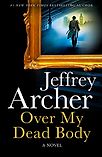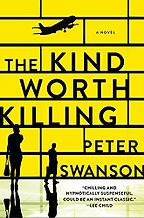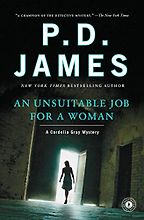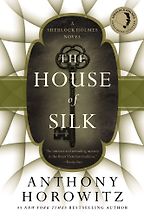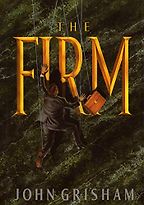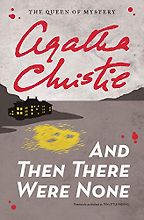You’ve chosen some of your favourite detective fiction for us, spanning quite a few decades. What makes a good work of detective fiction, what are you looking for as a reader?
I think one of the hardest things is that there are so many people who write in the genre. Writing is an overcrowded profession to start with, and crime fiction within the profession is even more overcrowded. Also, there are so many films and miniseries on television that you’re bombarded with it the whole time. To actually come up with anything original is very difficult indeed. I don’t want a book that I put down at chapter three or four because I can either see where it’s going, or I don’t think it’s very good. I want a book that’s exceptional.
There are great detective writers over the ages who are wonderful. The books I’ve chosen are ones that I think are unputdownable and exceptional. They only come once in a while and I’ve chosen five for you to consider.
Given it’s so overcrowded, how come you ended up writing in the detective fiction genre?
Well, I didn’t. As I’ve said very clearly, my book is not a detective story, it’s a story about a detective. I’m more interested in the life of William Warwick as he goes from being a constable on the beat—and, if I live long enough—through to being Commissioner of the Metropolitan Police. Each book will have a new subject. The first one is about art and he’s on the antiques squad. The second one is about drugs, the third about police corruption. Now, in the latest one, he’s head of the murder squad. He will go up one rank with each book, so in the first book he is a detective constable, in the second a detective sergeant, in the third a detective inspector. In the book you have in front of you, he has become a detective chief inspector.
“I want a book that’s exceptional”
So, with each book, you’re going to have a different subject and a different rank, right through to Commissioner of the Metropolitan Police—as long as I live to the age of 86, Sophie! That’s my only hope. Otherwise, he will never get to the Commissioner’s office.
I read a lot of crime fiction and I’m a fan of plot twists. But from what you’re saying, it’s sounds like you’re not going for that corner of the genre, where the book revolves around a ‘wow’ moment where you’re completely taken aback by something that you weren’t expecting. It’s more about the detective, is that right?
It is more about William himself, but there are three big twists in it. One caused a reader to write to the publisher and say, ‘I stopped breathing.’ That may be the best crit I’ve ever had in my life. So yes, I hope there are the usual twists and turns, but you’re quite right: it’s a book about a character who we will follow from leaving school, going to university, joining the Metropolitan Police and right the way through. That is equally important to the crimes he’s solving.
Let’s talk about the books you’re recommending. First on the list is The Kind Worth Killing which is by Peter Swanson. It’s a slightly Strangers on a Train-inspired plot, isn’t it?
I hadn’t thought about it that way, but you’re quite right, there is a bit of Strangers on a Train to it.
I found I was turning the pages and wanting to follow this strange situation. It’s about a man who meets this girl at an airport with red hair. I always wondered when I read that line—because an author is always looking for the clue that will give everything away—is the red hair going to be a clue? He sits next to her at an airport bar and tells her he’d like to murder his wife. Then, they happen to be on the same plane and they end up sitting next to each other. It’s about what happens after that, because he gets off the plane thinking, ‘Oh, well, that was just a plane journey with a woman I’ll never see again.’ But it wasn’t.
So it’s a real page turner?
For me, it was. I loved it and recommended it to a lot of people at the time because I’d never read Peter Swanson before. I have been reading him since, so it was a book that turned me into a fan.
Yes, thank you for that—because I hadn’t come across him either. It’s always exciting to discover someone new.
Absolutely right. The truth is that we’re all in that category. I spend my life saying to people, ‘Tell me someone I haven’t read! Tell me a book I ought to read!’ I do it all the time and get some very surprising and wonderful results. In fact, that’s how I discovered Stefan Zweig, who I think is arguably the greatest writer and storyteller of the last 100 years. I didn’t discover him until I was 60. A lady said to me, ‘It’s amazing you’ve got to this great age, Jeffrey, and not come across Stefan Zweig! He is one of the most respected authors of the last century.’
So, if you haven’t heard of Stefan Zweig, if you haven’t read his masterpiece—and I don’t call anything a masterpiece lightly—then you should. It’s called Beware of Pity. On the first page, his writing ability will hit you between the eyes. On the second, you will see why you have to turn the pages. He only wrote a couple of full-length novels. Sadly, he ended up committing suicide. He believed Hitler would take over the world and the Jews were doomed because of it.
That’s a pretty strong endorsement of Stefan Zweig, but we’d better turn back to our lighter topic. The next book you’ve chosen is An Unsuitable Job for a Woman. This is by PD James and it’s from 1972. So this book also made a good impression on you?
She’s a fine writer. I knew her in the House of Lords, of course. She was an absolutely delightful, charming person. This is the first of the Cordelia Gray series, who is a very tough, very intelligent, frankly, a very PD James woman. I mean, she could have been writing about herself.
Cordelia Gray takes over the Pryde detective agency on the death of her boss and has to run it. This is the first case she comes across. She’s asked to investigate the death of a young student in Cambridge. PD James lived in Cambridge, so she knows it backwards. The father of the student is a distinguished professor and considers it suicide. He asks her to wrap it up for him, but she delves into it and discovers it wasn’t a suicide…
Next up is The House of Silk by Anthony Horowitz, which is the first of his Sherlock Holmes stories. I knew vaguely that these books existed, but I hadn’t actually read one so I was very pleased to see this on your list.
He drives me mad, Anthony Horowitz. He is a dear friend and drives me completely bonkers because you can never tell what he’s going to write next. He’s so talented and so versatile. He goes from the Alex Rider books through to Sherlock Holmes through to James Bond through to a detective story without even stopping. I don’t know how he does it. He is amazing, but this is my favorite of his.
He decided to take on Sherlock Holmes. And the greatest compliment I can pay Anthony is you think it’s been written by Conan Doyle. It’s a brilliant story that starts with Watson and Sherlock Holmes sitting in their home, quietly having a drink at night, when this lunatic rushes in and tells them a mystery. They don’t believe a word of it, but they set out just because they’ve got nothing better to do—typical Holmes—and it turns into a magnificent tale. I think it’s the best thing Horowitz has ever done.
I like the way the book starts by recounting how Holmes and Watson met, as it’s told in A Study in Scarlet. I’ve read all the Sherlock Holmes stories—it was a while ago now, admittedly—but I did feel, reading this story, that this was another one.
He captured it, didn’t he? He captured it, which is so clever. By page 30, you think you’re actually reading Sherlock Holmes. That takes some doing. He’s a very able man, but he still gets me cross. I wish he’d concentrate on one subject so I can have book after book. I begged him to write another Sherlock Holmes. I said, ‘What I would do, Anthony, is say you bought this house and, to your shock and surprise, you discovered six manuscripts in the bottom of a drawer with Dr Watson’s signature on them. And now you’re going to make a fortune just publishing them!’ So, get on with it, Anthony. But he refused to do that and wrote another Rider book.
Let’s go on to The Firm by John Grisham. This is a fantastic legal thriller, I still remember staying up all night reading it when it came out.
It’s probably the best thing Grisham has ever done. It came out 30 years ago. It’s a wonderful story about a young man who leaves Harvard third in his class. Every law firm in the country is desperate to get hold of him. He comes from a poor family, he’s just got married, and he gets an offer he just can’t refuse. He gets a wonderful salary, wonderful provisions, wonderful everything. It includes what he thought was important at the time, a BMW.
Then he discovers he’s working for the mafia. He’s a very moral man and he has to find a way out of this problem, realizing you don’t get severance pay, you just disappear. It’s a bloody good novel and it’s Grisham at his best.
Part of its appeal for me was the rags-to-riches element.
So, you’re a Kane and Abel fan are you?
I loved Kane and Abel, yes. I read lots of your books as a teenager, so it’s really fun, all these years later, to get a chance to chat with you.
I was flattered to be asked. Thank you very much indeed.
Now, if you’ve never read John Grisham, this is the one to start on, because his genius is that he was a professional lawyer as a young man, after coming down from university. What you get is the real feeling of what it’s like to work in an American firm. He captures that brilliantly because he’s done it, he’s been there. If you’ve never read him, start with The Firm.
Your final recommendation dates from the golden age of mystery writing, the 1930s. This is And Then There Were None by Agatha Christie. I love books from this era. Are you a Christie fan, then?
I think Agatha Christie would have a terrific problem nowadays, not least with Poirot and his genius because you couldn’t gather the six or seven possibly guilty people into one room and give them a lecture and then quiz them. They would just say, ‘Talk to my lawyer’ and walk out. But she could get away with that 50 years ago.
The other thing she couldn’t get away with today, and she’d be the first to accept it, is DNA. My dear friend, Gilbert Gray QC, one of the great murder QCs, said it ruined his career. He was halfway through it when DNA arrived. He was getting people off, being paid amazing fees, he was the leading murder barrister in the north of England. Suddenly DNA came along, and he was losing every single case. He brought to my attention that Agatha Christie, dare one say it, died at the right time. She managed to miss DNA.
Five Books interviews are expensive to produce. If you're enjoying this interview, please support us by donating a small amount.
I have chosen what I think is a masterpiece. Now, there are always the snooties, and there always will be, particularly in this country. There are snobs who don’t like authors who dare to tell stories and don’t like success. Agatha Christie was a brilliant storyteller. She didn’t sell millions of books by mistake. But the best one is And Then There Were None.
It’s a wonderful story about a group of people caught on an island, and someone gets murdered. And then someone else gets murdered. And then someone else gets murdered. The numbers are going down and down, and you’re wondering who is murdering all these people. The television version was quite outstanding as well, with Charles Dance playing the lead. He was terrific, I’ve never seen him better.
But for those who have wondered where to start with Agatha Christie, this and The ABC Murders are frankly the two best she’s ever done, and if I had to pick just one, I would pick And Then There Were None.
I’ve read all the Agatha Christies, probably a couple of times, mostly just as fun stories. But with And Then There Were None, thinking about it still makes me feel quite uncomfortable. That scene where the girl is swimming in the sea, and she lets the little boy drown. Just the moral ambiguity was horrible and it’s stayed with me.
Her biographers say she first got the story from a German author and then wrote her version of it. I have no problem with that at all because I suspect her version of it was far superior. But it wasn’t her usual theme, it wasn’t her normal, ‘This is a jolly good read, enjoy Christmas!’ That’s what she was famous for, ‘Have a Christie at Christmas.’ This wasn’t exactly a fun, Christmas stocking book.
As I say, it was suggested she originally read the story by not a well-known, but not an unknown German author. I’m hardly one to complain because I attempted to rewrite The Count of Monte Cristo in the form of A Prisoner of Birth. I made it very clear that was the case. So many authors rely on stories and, frankly, the great line that there are only six great stories and all we do is variations on them may indeed have an element of truth.
Over My Dead Body by Jeffrey Archer is out now, priced £20 hardback (HarperCollins)
Interview by Sophie Roell, Editor
October 16, 2021. Updated: September 24, 2025
Five Books aims to keep its book recommendations and interviews up to date. If you are the interviewee and would like to update your choice of books (or even just what you say about them) please email us at [email protected]

